Please note that only publications relevant to mesophotic reefs
are indexed.

|
Landscape video mosaic from a mesophotic coral reef | article
Gleason ACR, Gracias N, Lirman D, Gintert BE, Smith TB, Dick MC, Reid RP (2010)
Coral Reefs 29:253
|
|
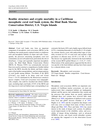
|
Benthic structure and cryptic mortality in a Caribbean mesophotic coral reef bank system, the Hind Bank Marine Conservation District, US Virgin Isl... | article
Smith TB, Blondeau J, Nemeth RS, Pittman SJ, Calnan JM, Kadison E, Gass J (2010)
Coral Reefs 29:289-308
|
|

|
Mesophotic bioerosion: Variability and structural impact on US Virgin Island deep reefs | article
Weinstein DK, Smith TB, Klaus JS (2014)
Geomorphology 222:14-24
|
|

|
Assessing coral reef health across onshore to offshore stress gradients in the US Virgin Islands | article
Smith TB, Nemeth RS, Blondeau J, Calnan JM, Kadison E, Herzlieb S (2008)
Mar Pollut Bull 56:1983-1991
|
|

|
Coral disease prevalence and host susceptibility on mid-depth and deep reefs in the United States Virgin Islands | article
Calnan JM, Smith TB, Nemeth RS, Kadison E, Blondeau J (2008)
Rev Biol Trop 56:223-234
|

|

|
Fertile fathoms: Deep reproductive refugia for threatened shallow corals | article
Holstein DM, Smith TB, Gyory J, Paris CB (2015)
Sci Rep 5:12407
|

|

|
Spectral Diversity and Regulation of Coral Fluorescence in a Mesophotic Reef Habitat in the Red Sea | article
Eyal G, Wiedenmann J, Grinblat M, D'Angelo C, Kramarsky-Winter E, Treibitz T, Ben-Zvi O, Shaked Y, Smith TB, Harii S, Denis V, Noyes T, Tamir R, Loya Y (2015)
PLoS ONE 10:e0128697
|

|

|
Caribbean mesophotic coral ecosystems are unlikely climate change refugia | article
Smith TB, Gyory J, Brandt ME, Miller WJ, Jossart J, Nemeth RS (2016)
Global Change Biol 22:2756–2765
|

|

|
Habitat heterogeneity reflected in mesophotic reef sediments | article
Weinstein DK, Klaus JS, Smith TB (2015)
Sediment Geol 329:177-187
|
|

|
Modeling vertical coral connectivity and mesophotic refugia | article
Holstein DM, Paris CB, Vaz AC, Smith TB (2016)
Coral Reefs 35:23-37
|
|

|
Geographic differences in vertical connectivity in the Caribbean coral Montastraea cavernosa despite high levels of horizontal connectivity at shal... | article
Serrano X, Baums IB, O'Reilly K, Smith TB, Jones TL, Shearer TL, Nunes FLD, Baker AC (2014)
Mol Ecol 23:4226-4240
|
|

|
A depth refugium from catastrophic coral bleaching prevents regional extinction | article
Smith TB, Glynn PW, Maté JL, Toth LT, Gyory J (2014)
Ecology 95:1663-1673
|
|

|
Depth-independent reproduction in the reef coral Porites astreoides from shallow to mesophotic zones | article
Holstein DM, Smith TB, Paris CB (2016)
PLoS ONE 11:e0146068
|

|

|
Long distance dispersal and vertical gene flow in the Caribbean brooding coral Porites astreoides | article
Serrano XM, Baums IB, Smith TB, Jones RJ, Shearer TL, Baker AC (2016)
Sci Rep 6:21619
|

|

|
Seasonal variability in calorimetric energy content of two Caribbean mesophotic corals | article
Brandtneris VW, Brandt ME, Glynn PW, Gyory J, Smith TB (2016)
PLoS ONE 11:e0151953
|

|

|
Potential structuring forces on a shelf edge upper Mesophotic Coral Ecosystem in the US Virgin Islands | article
Smith TB, Brandtneris VW, Canals M, Brandt ME, Martens J, Brewer RS, Kadison E, Kammann M, Keller J, Holstein DM (2016)
Front Mar Sci 3:115
|

|

|
Coral growth, bioerosion, and secondary accretion of living orbicellid corals from mesophotic reefs in the US Virgin Islands | article
Weinstein DK, Sharifi A, Klaus JS, Smith TB, Giri SJ, Helmle KP (2016)
Mar Ecol Prog Ser 559:45-63
|
|

|
Fungi associated with mesophotic macroalgae from the ‘Au‘au Channel, west Maui are differentiated by host and overlap terrestrial communities | article
Wainwright BJ, Zahn GL, Spalding HL, Sherwood AR, Smith CM, Amend AS (2017)
PeerJ 5:e3532
|

|
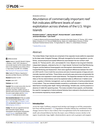
|
Abundance of commercially important reef fish indicates different levels of over-exploitation across shelves of the U.S. Virgin Islands | article
Kadison E, Brandt M, Nemeth R, Martens J, Blondeau J, Smith T (2017)
PLoS ONE 12:e0180063
|

|

|
Growth rates of Porites astreoides and Orbicella franksi in mesophotic habitats surrounding St. Thomas, US Virgin Islands | article
Groves SH, Holstein DM, Enochs IC, Kolodzeij G, Manzello DP, Brandt ME, Smith TB (2018)
Coral Reefs 37: 345–354
|
|

|
The United States Virgin Islands Territorial Coral Reef Monitoring Program: Year 11 Annual Report | report
Smith TB, Kadison E, Henderson L, Brandt ME, Gyory J, Kammann M, Wright V, Nemeth RS (2011)
The United States Virgin Islands Territorial Coral Reef Monitoring Program
|
|

|
The United States Virgin Islands Territorial Coral Reef Monitoring Program: Year 14 Annual Report | report
Smith TB, Kadison E, Ennis RS, Gyory J, Brandt ME, Wright V, Nemeth RS, Henderson L (2014)
|
|

|
The United States Virgin Islands Territorial Coral Reef Monitoring Program: Year 15 Annual Report | report
Smith TB, Ennis RS, Kadison E, Weinstein DW, Jossart J, Gyory J, Henderson L (2015)
|
|

|
Connectivity of Pulley Ridge With Remote Locations as Inferred From Satellite‐Tracked Drifter Trajectories | article
Olascoaga MJ, Miron P, Paris C, Pérez‐Brunius P, Pérez‐Portela R, Smith RH, Vaz A (2018)
JGR Oceans 123:5742-5750
|
|

|
The United States Virgin Islands | chapter
Smith TB, Brandt ME, Brandtneris VW, Ennis RS, Groves SH, Habtes S, Holstein DM, Kadison E, Nemeth RS (2019)
in: Mesophotic Coral Ecosystems (Springer) by Loya Y, Puglise KA, Bridge TCL
|
|
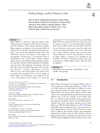.pdf)
|
Pulley Ridge, Gulf of Mexico, USA | chapter
Reed JK, Farrington S, David A, Harter S, Pomponi SA, Diaz MC, Voss JD, Spring KD, Hine AC, Kourafalou VH, Smith RH, Vaz AC, Paris CB, Hanisak MD (2019)
in: Mesophotic Coral Ecosystems, Coral Reefs of the World (Springer) by Loya Y, Puglise KA, Bridge TCL
|
|
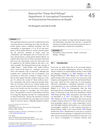
|
Beyond the “Deep Reef Refuge” Hypothesis: A Conceptual Framework to Characterize Persistence at Depth | chapter
Bongaerts P, Smith TB (2019)
in: Mesophotic Coral Ecosystems (Springer Nature Switzerland AG 2019) by Yossi L, Puglise KA, Bridge T
|
|

|
Disturbance in Mesophotic Coral Ecosystems and Linkages to Conservation and Management | chapter
Smith TB, Holstein DM, Ennis RS (2019)
in: Mesophotic Coral Ecosystems () by Loya Y, Puglise KA, Bridge TCL
|
|

|
Predicting the distribution of threatened orbicellid corals in shallow and mesophotic reef ecosystems | article
Egan KE, Viehman TS, Holstein DM, Poti M, Groves SH, Smith TB (2021)
Mar Ecol Prog Ser 667:61-81
|
|

|
Environmental and biological drivers of white plague disease on shallow and mesophotic coral reefs | article
Chaves‐Fonnegra A, Panassiti B, Smith TB, Brown E, Clemens E, Sevier M, Brandt ME (2021)
Ecography 44:1071-1085
|
|

|
Ecosystem Services of Mesophotic Coral Ecosystems and a Call for Better Accounting | chapter
Holstein DM, Fletcher P, Groves SH, Smith TB (2019)
in: Mesophotic Coral Ecosystems (Springer) by Loya Y, Puglise KA, Bridge TCL
|
|

|
Differing lesion recovery rates of two Caribbean stony coral species across a shallow water to mesophotic depth gradient suggest different sensitiv... | article
Townsend JE, Brandt ME, Mukherjee S, Medina M, Smith T (2023)
Coral Reefs
|
|

|
Mesophotic Coral Ecosystems - A lifeboat for coral reefs? | report
Andradi-Brown D, Laverick J, Bejarano I, Bridge T, Colin PL, Eyal G, Jones R, Kahng S, Reed J, Smith T, Spalding HL, Wood E (2016)
|
|
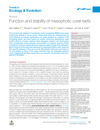
|
Function and stability of mesophotic coral reefs | article
Slattery M, Lesser MP, Rocha LA, Spalding HL, Smith TB (2024)
TREE 39:585-598
|
|




